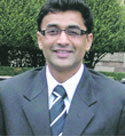Some important data management principles that apply to any research are:
1. The analysis must be reconstructable from the raw data and Vice versa. This means that the raw data must be collected and maintained, that changes must be clearly documented, and that data processing method must be documented.
2. The data collected should answer the scientific question under investigation.
3. Each data element should be non -ambiguously defined such that individual not involved with the research can understand and use the data.
a. Ensure that knowledge about the data resides in the organization, not within individuals.Use standards
b. Use standards
4. Data should be measured, recorded & processed consistently.
5. Data should be measured, recorded & processed such that it meets the desired accuracy levels
6. Measurement, recording & processing methodologies should not alter the meaning of the data.
7. Data should be measured, recorded & processed in a timely manner
a. Data should be recorded as close as possible to the time of measurement or observation.
b. Data checking should occur as close to measurement or observation as possible.
8. Data & metadata should be stored so that it persists (keep on, carry up) unadulterated for the required time period
a. Maintain data back-ups .Think negative keep “an heir & a spare.
9. Data should be attributable to the measure/observer, recorder, test, subject, measuring device, location & time point.
10. Expert things to go awry (wrong) :
a. Oversee (manage, supervise) data collection.
b. Monitor the research & data collection process, not just the data.
Basic principles serve as a foundation for practice. They guide us to good practice in new & undefined situations. This is particularly important when the industry is undertaking new types of research, managing new types of data & employing new technology. Adhering to these basic principles of good data management can help to ensure a successful research project that contributes to the body of knowledge. As clinical & basic science research become increasingly sophisticated & expensive, few investigators can afford to risk the costs that accompany ignorance of good data management principles.
“What you get out depends on what you put in; and as the grandest mill in the world will not extract wheat-flour from peacords, so pages of formulae will not get a definite result out of loose data” Thomas Henry Huxley
Monday, December 17, 2007
Subscribe to:
Post Comments (Atom)



2 comments:
its very good knowledgable task.
it is a good thought to share our knowledge.
GDMP must be implemented in CDM in order to avoid the creeping of the loose data and preserve the consistency and quality of the data. Worth reading!
Post a Comment